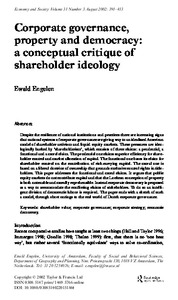Corporate governance, property and democracy: a conceptual critique of shareholder ideology

2002
31
3
391-413
management strategy ; shareholder ; workers participation ; corporate governance ; cross section analysis
Workers participation and European works councils
English
Bibliogr.
"Despite the resilience of national institutions and practices there are increasing signs that national systems of corporate governance are giving way to an idealized American model of shareholder activism and liquid equity markets. These pressures are ideologically backed by 'shareholderism', which consists of three claims: a prudential, a functional and a moral claim. The prudential one claims superior efficiency for shareholder control and market allocation of capital. The functional one bases its claim for shareholder control on the contribution of risk-carrying capital. The moral one is based on a liberal doctrine of ownership that grounds exclusive control rights in titleholders. This paper addresses the functional and moral claims. It argues that public equity markets do not contribute capital and that the Lockean conception of property is both untenable and morally reprehensible. Instead corporate democracy is proposed as a way to accommodate the connicting claims of stakeholders. To do so an intelligent division of democratic labour is required. The paper ends with a sketch of such a model, through short outings to the real world of Dutch corporate governance "
Digital
The ETUI is co-funded by the European Union. Views and opinions expressed are however those of the author(s) only and do not necessarily reflect those of the European Union or the ETUI.